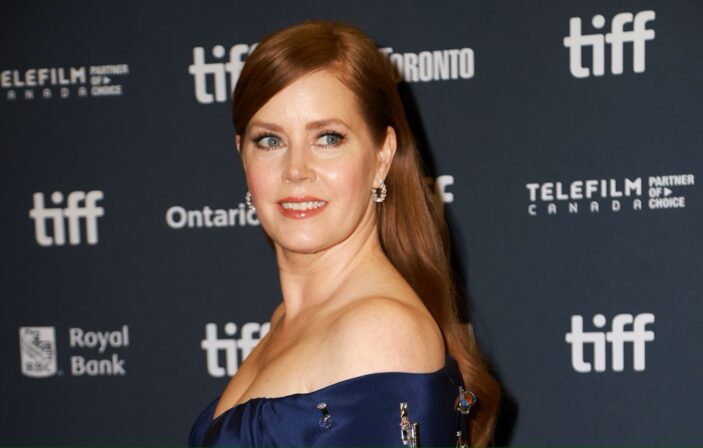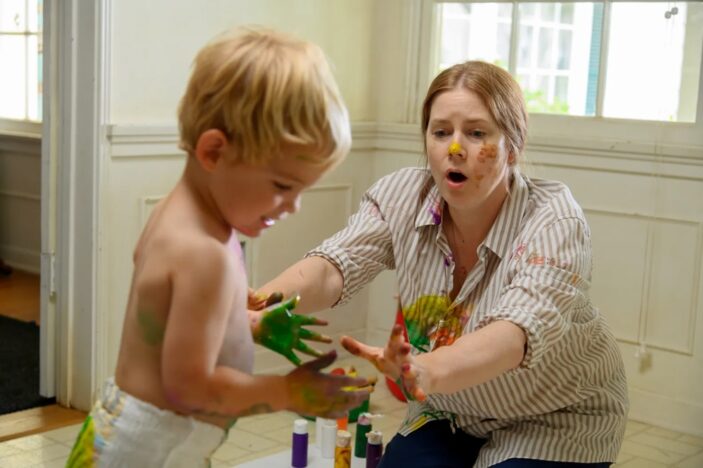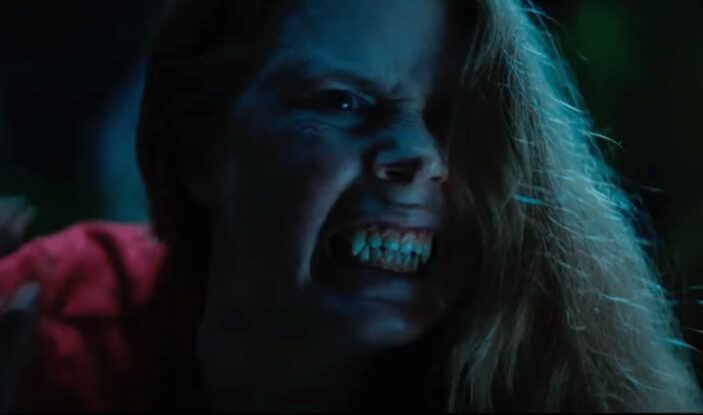
Based on Rachel Yoder’s acclaimed novel, Nightbitch tells of an artist who pauses her career to be a stay-at-home mother. Seeking a new chapter in her life, she encounters just that when her nightly routine takes a surreal turn and her maternal instincts begin to manifest in canine form.
Brought to life to screen by lauded filmmaker Marielle Heller and actress Amy Adams, who received a Golden Globe nomination this year for Best Actress – Musical or Comedy, Nightbitch, following its festival run last year, is now available to stream in Australia on Disney+ for all to witness this “meditation on motherhood, isolation and female rage, driven at the helm by a fearless Adams”, as Peter Gray stated in his review here.
To coincide with the release, Peter was invited to the global press conference to hear Amy Adams speak on the film’s production and the important conversations it has generated since.
This has been described as a passion project for you. And you’re a producer on this as well. How much preparation did you do?
I first got the transcript of the book before it had been published. And I just thought Rachel (Yoder, author) had such a unique narrative. There was something I deeply identified (with) about the idea of loss of identity and transformation, and using motherhood as an allegory for those things. When thinking about how to bring it to life, because it was so specific in tone and was going to require a lot of unique visual talents, I knew that going to Marielle Heller, who at the time had just had a baby, and was living in a cabin with her husband, was going to have a unique and personal perspective on this story.
(Marielle) wrote it pretty quickly. Then, I think, we made it about a year and a half later after talking. But we had many conversations along the way, so by the time we got to set, we already had a real short-hand in understanding of what was going to be communicated and how the material was approached. It was a really interesting preparatory process, because there was no way to predict a lot of the time what was going to be going on. Working with three-year-olds, I knew it was important that I had a clear understanding of what needed to happen in any given moment to allow a freedom and live in a sense of play. There was such a wonderful release and freedom in approaching the film the way Marielle did.
With gender roles and parenthood, as seen in the film, these days we see that men share the role, but there are still lapses. You know, we see that the husband character accuses your character of there being no milk in the house…
Oh, yeah, I know that conversation (laughs).
Despite all the things the amazing mother is doing, husbands still sometimes expect certain things. Can you talk about your reflection on that?
One of the things I loved so much about the book, and very much so about Marielle’s script, was how accurately depicted relationship conflict was. That was something I hadn’t played before in this uniquely organic way. It was just the little details, like when the husband talks about making the coffee, right? That was the perfect one that I didn’t catch again until this last time I watched it. I think the reason it resonated with me this time is because my husband, over the summer, we had a slight misunderstanding over the coffee maker, because I had made the coffee the previous day. We were in a new location, I was working, and he was asking me how did (the coffee maker) work. I told him that if I figured it out, he could figure it out. There was something about that exchange and communication that felt so authentic to me,
As far as traditional or non-traditional. My relationship with my husband, we switch roles from time to time. And he’s really great about carrying that. But he still can’t figure out the coffee machine by himself (laughs), but he’s great.

One of the more insightful aspects of the film was the trajectory when your character first goes to the library with her son. She’s almost dismissive of the other women, because they’re just “house mothers.” They don’t have careers. We’re hearing your internal thoughts, but then you’re awakened. These people are superheroes, in a way. What a mother has to do. Can you talk about that aspect of the movie, and how much you hope that there is the discussion around people realising that what a mother has to do is tremendous work?
Yeah, absolutely. I think what’s interesting about the way that the film approaches identity is this idea of excluding ourselves from community can be so isolating. This is where the character finds herself, as she no longer identifies with the friends she used to have, and yet she hasn’t found a new group of people in which she identifies herself. And I think a part of that is not wanting to release an idea of herself, right? Not wanting to let go of this person she believed herself to be. I think once she embraces that joy, the play, the feral nature of motherhood, that’s when she starts to feel more validated in that experience.
I think if we validated the idea of parenthood as a very important job and how we raise out children and the resources we provide for our children as a community, that’s going to elevate humanity, right? That’s what I believe. And I hope that conversation happens. But even acknowledging the skill set of a mother, and I think that’s what’s great about having community, is each person brings their own special skill set. And it develops over time.
With the film itself, the ending here is quite different from the book. How did you, as a producer, work with Marielle to find a unique ending that worked for the film, but also stayed true to Nightbitch‘s artistic expression?
Marielle can probably answer this better than I can, but in talking to her about the book, and what resonated, she and I are both very pragmatic people. But we also really believe in our experience of motherhood and that it’s one of optimism and great hope. We look for that. And that’s where wanted to leave. We didn’t want to leave the movie with a negative comment, because our experience and what we believe about parenthood is very positive. We wanted to uplift the experience.
You mentioned earlier about working with three-year-olds in the film, but you have a daughter who is a teenager. How do you as a parent, as part of a community, help teenagers today avoid the type of isolation you character experiences?
It’s such a good question, such an important question, and one that I’m grappling with every day. I wish I had the answer to that. As for me? I just really try to stay open and stay present for the conversation. I promised her I wouldn’t talk too much about her now (and) how she is. I’ll talk about her in the past. But I will say I don’t think I have the answers to the bigger issues at large. For myself, I just try to stay available to her. So when she wants to talk and share in those moments, I’m present for her. Present and available. I wish I had that answer. I know it’s a real thing. There’s a lot of personal stories, but they’re not mine, so I don’t share them. But I think it’s a very good question and an important issue.

The movie itself is open to interpretation. When it comes to the more fantastical sequences, what’s your interpretation? Do you take them literally or poetically?
It’s hard. I don’t want to give that away. For me, they exist in both realities, right? I believe that she believes, and I think there’s something beautiful and poetic in that. When she’s having those inner monologues, they happen in a hair of a second, right? All of that goes through her head and then her response is immediate. The way I approached it is that it’s kind of magical realism. That’s how Marielle and I approached it, and it’s open to interpretation, yeah. I don’t want to say what I thought, if that’s okay?
What’s the biggest compliment or response that you could hope to take away from this film?
There’s been two responses that were really moving to me. I’ve heard “I feel seen”, and the one that I really liked and took away was, “I went home and called my mom.” That one, I was like, “Oh good. I’m glad.”
Nightbitch is now available to stream on Disney+ in Australia.
